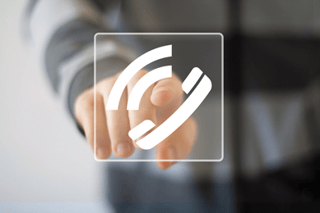 Last week, we started to take a look at the basics of VoIP -- what it is and how it works. If you're like many of our readers, you were probably pleasantly surprised to learn how simple VoIP actually is despite offering so many technological advantages.
Last week, we started to take a look at the basics of VoIP -- what it is and how it works. If you're like many of our readers, you were probably pleasantly surprised to learn how simple VoIP actually is despite offering so many technological advantages.While the simplicity and affordability of VoIP are certainly appealing, though, you probably have questions about the quality of service and how an Internet-based communications system will differ from your legacy system. We completely understand your concerns and are ready to help you lay them to rest in this second installment of our 3-part series on the basics of VoIP.
VoIP Quality
The biggest fear that hoteliers have about switching to a VoIP phone system is that the quality of service will be reduced. After all, hotels rely on phone calls for reservations, and guests require excellent phone services in order to communicate with the front desk and make outgoing calls for business-related or personal matters. Fortunately, there's nothing to fear when it comes to VoIP. There's virtually no difference in the sound quality, nor will you notice any delays, echoes, or dropped calls.
Because VoIP tends to be so reliable, you'll find that any connection problems are related to the equipment being used. As a result, you have full control over the quality of service based upon the equipment that you select. Be sure to work with a reliable provider to ensure that you have the best IP phones, compatible router, and other related tools. It's also important to verify that your VoIP bandwidth is key for voice quality. Finally, consider the codec being used. Different codecs are designed for different specific uses, so make sure that you are using the right codec to prevent reduced call quality.
Transitioning from Legacy to VoIP: What to Expect
So what's the difference between your existing legacy phone system and a VoIP system? Will you need to be re-trained on how to make a simple telephone call? Is there some sort of learning curve? You'll be relieved to know that making a VoIP call is virtually no different than utilizing a landline. Of course, you will want to take some time to train your staff on how to maximize the new features that come with your phone system, but you'll find that this is a quick and simple process.
Before you can pick up the phone and start dialing, though, there are some things you'll need to consider. First, make sure that your current PBX supports SIP. If not, you'll need a SIP gateway. Next, you'll likely want to shift any of your existing business numbers and extension plans over to your new VoIP provider to manage the handover. Also be aware that you'll need to update to an IP cable infrastructure, so your standard telephone cabling will need to be swapped out for Cat 5/6 cabling for compatibility. Finally, work with your VoIP provider to discuss security options and training so that you can ensure the maximum benefit from your new communications system.
If, after discovering the basics of what VoIP is and what you can expect from upgrading, you feel you're ready to make the switch, it's time to evaluate your existing network. Is your hotel ready to transition to a VoIP system, and what can you do to make the switch as smooth and seamless as possible? Find out more in the conclusion to our 3-part series on the basics of VoIP.
Do you have burning questions that need to be addressed right away? Give the professionals at PhoneSuite a call today to discuss how VoIP could work for your hotel.

